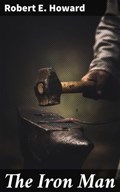In "The Iron Man," Robert E. Howard crafts a compelling narrative that melds elements of fantasy, horror, and adventure. Set against the backdrop of a post-apocalyptic Earth, Howard introduces a formidable protagonist, an iron-clad warrior, who embodies primal strength and complexity. The prose is characteristic of Howard's vigorous style, pulsating with vivid imagery and relentless action, invoking the dark undercurrents prevalent in early 20th-century pulp fiction. The novella encapsulates themes of survival, courage, and the struggle against an inexorable destiny, echoing the zeitgeist of a world facing existential threats. Robert E. Howard, primarily known for creating the iconic character Conan the Barbarian, was a prolific writer whose works tapped into the fears and fascinations of his era. Deeply influenced by his Texan roots and the dynamic tensions of early 20th-century America, Howard employed a rich tapestry of mythic elements and personal experiences to shape his narratives. "The Iron Man" exemplifies his engagement with the idea of the warrior as a cultural archetype, reflecting both personal and societal struggles. For aficionados of fantasy and adventure literature, "The Iron Man" stands as an essential read, illuminating Howard's narrative prowess and thematic depth. Its relentless pace and imaginative scope will captivate new readers and provide rich insights for those familiar with Howard'Äôs bibliography, making it a significant contribution to the canon of speculative fiction.

